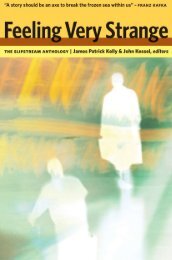The Curse of the Wer.. - Site de Thomas - Free
The Curse of the Wer.. - Site de Thomas - Free
The Curse of the Wer.. - Site de Thomas - Free
You also want an ePaper? Increase the reach of your titles
YUMPU automatically turns print PDFs into web optimized ePapers that Google loves.
104 THE CURSE OF THE WEREWOLF<br />
in particular produced wi<strong>de</strong>spread reconsi<strong>de</strong>ration <strong>of</strong> masculinity,<br />
to <strong>the</strong> extent that it began to be un<strong>de</strong>rstood as a category in need <strong>of</strong><br />
consi<strong>de</strong>rable revision. In <strong>the</strong> 1970s, for example, issues raised by <strong>the</strong><br />
Women’s Liberation Movement led to <strong>the</strong> view that men suffer as much<br />
as women un<strong>de</strong>r patriarchy, and that <strong>the</strong>y <strong>the</strong>refore nee<strong>de</strong>d to reject<br />
‘traditional male roles’ by becoming ‘more sensitive and emotionally<br />
expressive’. 33 A men’s movement began to emerge to champion this i<strong>de</strong>a,<br />
but such <strong>de</strong>velopments quickly led to a perception that masculinity<br />
was now in ‘crisis’.<br />
As a result, <strong>the</strong> reconsi<strong>de</strong>ration <strong>of</strong> masculinity began to change<br />
direction during <strong>the</strong> 1980s. It was argued that knowledge and experience<br />
<strong>of</strong> masculinity had been enfeebled and impoverished by a variety<br />
<strong>of</strong> forces, including industrialization, urbanization and feminism. A<br />
reclaiming <strong>of</strong> <strong>the</strong> ‘<strong>de</strong>ep masculine’ was <strong>the</strong>refore proposed, as a means<br />
<strong>of</strong> regenerating and invigorating men’s ability to contribute positively<br />
to <strong>the</strong>ir society and culture, and in particular <strong>the</strong>ir relationships with<br />
women and children. Following <strong>the</strong> example <strong>of</strong> a branch <strong>of</strong> feminism<br />
which sought to reclaim and ‘valorize’ mythic imagery <strong>of</strong> <strong>the</strong> god<strong>de</strong>ss<br />
as a source <strong>of</strong> strength and inspiration for women, <strong>the</strong> ‘mythopoetic<br />
men’s movement’ turned to myth and legends for sources <strong>of</strong> <strong>the</strong> ‘<strong>de</strong>ep<br />
masculine’ that was felt to be missing in men’s lives. Famously, this<br />
project was facilitated through workshops or retreats, during which<br />
groups <strong>of</strong> men would withdraw into <strong>the</strong> wil<strong>de</strong>rness to enable a fuller<br />
connection to <strong>the</strong>ir masculinity.<br />
E. Anthony Rotundo observes that <strong>the</strong> exploration <strong>of</strong> masculinity in<br />
such men’s workshops bears a strong resemblance to i<strong>de</strong>as about masculinity<br />
that circulated in <strong>the</strong> late nineteenth century. 34 He notes that<br />
during <strong>the</strong> fin <strong>de</strong> siècle, a more corporeal version <strong>of</strong> masculinity arose<br />
to compete with mo<strong>de</strong>ls <strong>of</strong> manhood that emphasized <strong>the</strong> cerebral qualities<br />
<strong>of</strong> reason, morality and psychic discipline. <strong>The</strong> focus on <strong>the</strong> body<br />
accompanied a neo-romantic celebration <strong>of</strong> nature as <strong>the</strong> space where<br />
men could physically connect with <strong>the</strong>ir masculinity, and drew upon<br />
<strong>the</strong> celebration <strong>of</strong> ‘primitive man’ in <strong>the</strong> work <strong>of</strong> Jean-Jacques Rousseau<br />
and Friedrich Nietzsche. Certainly, representations <strong>of</strong> masculinity from<br />
this period <strong>of</strong>ten displayed <strong>the</strong> male body in outdoor, competitive, or





